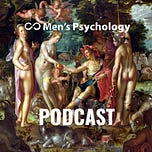Welcome to a series of videos that will introduce you to a simple model of men’s psychology that draws on some of the growing body of research on men.
There’s more than meets the eye with men, just as there is with women. Men are driven at the core by instincts the same as women—masculine instincts.
However, just like women, they have emotions of very similar types and style. The expression is different because emoting is in some part, governed by the instincts.
Finally, the intellect and mature executive functions are also just like those of women (we have identical IQ potential - and “EQ” potential.) Yet the masculine instincts also influence that, and our communication and behavior.
This synthesis of the old and new, the rigorous and the elegant, and most important of all, an attempt at “unification of the psychologies” is the aim of Masculine Psychology, as we start to discuss in this first video.
It’s Masculine Psychology (originally, MMP), which is available in videos delivered one day at a time, for the full 5+ hours of the course (available to paid subscribers only)…
Upgraded Members get full access to the full program and many others from Men’s Psychology right away without waiting for lesson-by-lesson:
SUMMARY:
Dr. Paul presents a structured overview of Erik Erikson's stages of development, discussing the psychological growth process as it relates to specific age ranges and the virtues that emerge from successfully navigating each stage. Key points include:
1. **Erikson's Stages**: The speaker emphasizes Erikson's framework which identifies critical stages of emotional and psychological development throughout life, marking specific ages alongside the central conflicts that individuals face.
2. **First Stage: Trust vs. Mistrust (0-1 year)**: The first stage focuses on the development of trust through early caregiving experiences. A lack of trust may be traced back to negative early parenting.
3. **Second Stage: Autonomy vs. Shame and Doubt (2-3 years)**: In this stage, toddlers learn to assert their independence while having a secure base with their caregiver. Positive experiences foster autonomy, while negative ones may lead to feelings of shame and doubt about their abilities.
4. **Third Stage: Initiative vs. Guilt (4-6 years)**: During preschool years, children begin to assert control and take initiative in their activities. A successful navigation of this stage leads to a sense of initiative, whereas guilt may arise from overly controlling environments.
5. **Virtues Developed**: The speaker describes the virtues cultivated through each of these stages. For the first stage, the resulting virtue is **hope**; for the second stage, it is **willpower** or the sense of self-efficacy (the belief that one can perform tasks independently).
6. **Masculinity and Help-Seeking Behavior**: The speaker notes the challenges men face in asking for help, connecting societal expectations of masculinity to underreporting of emotional struggles, such as depression. They suggest a need for approaches that effectively reach men regarding emotional and mental health issues.
Overall, the discussion synthesizes Erikson’s theory with contemporary reflections on emotional growth, masculinity, and the importance of navigating early developmental stages successfully to foster psychological resilience and well-being.













Share this post